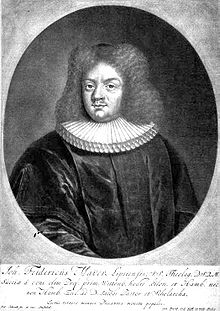Johann Friedrich Mayer (theologian)
| Johann Friedrich Mayer | |
|---|---|
 |
|
| Born | 6 December 1650 Leipzig |
| Died |
30 March 1712 (aged -39) Stettin |
| Nationality | German |
| Spouse(s) | Catharina Sabina Welsch |
| Children | Johann Abraham Mayer |
| Theological work | |
Johann Friedrich Mayer (6 December 1650 – 30 March 1712) was a German Lutheran theologian and professor of theology at Wittenberg University. He was an important champion of Lutheran orthodoxy and General Superintendent of Swedish Pomerania.
Johann Friedrich Mayer was born in Leipzig on 6 December 1650 as the son of Johann Ulrich Mayer and his wife Ursula Sophia Braun. He attended the University of Leipzig and was awarded a bachelor's degree on 21 April 1666. A master's degree in liberal arts from the Faculty of Philosophy Faculty followed on 30 January 1668. He then attended the University of Strasbourg, where he applied himself to theological studies under Balthasar Friedrich Salzmann and Balthasar Bebel until 1670.
On 13 February 1671, he joined the Theological Faculty of Leipzig University. On 29 January 1672, he was made Saturday preacher (assistant pastor) in Leipzig, and later that year he was appointed superintendent in Leisnig. On 29 May 1673 he obtained his licentiate and on 19 October 1674 his doctorate in Theology. On 27 November 1678, he was appointed pastor and superintendent in Grimma.
However, he did not find the position in Grimma fulfilling and wished to pursue an academic career. During his work as pastor, Mayer had made a name for himself as a writer of pamphlets against Syncretists, Arminianists and Papists.
By decision of the Saxon High Consistory in Dresden, he was appointed fourth professor of theology at the University of Wittenberg on 12 May 1684, where he worked alongside Abraham Calovius, Johannes Andreas Quenstedt, and Johann Deutschmann. This post entailed serving as second preacher at the Wittenberg Castle Church and administering the state scholarships. In his inaugural address he argued, with reference to Philipp Spener's Pia desideria, that theology should pursue piety rather than engaging in speculation.
...
Wikipedia
